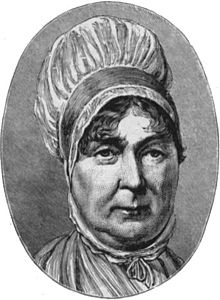Elizabeth Fry | |
|---|---|
 | |
| Born | Elizabeth Gurney 21 May 1780 Norwich, Norfolk, England |
| Died | 12 October 1845 (aged 65) Ramsgate, Kent, England |
| Occupation | reformer |
| Spouse | |
| Children | 11 |
Elizabeth Fry (née Gurney; 21 May 1780 – 12 October 1845), sometimes referred to as Betsy Fry,[1][2][3] was an English prison reformer, social reformer, philanthropist and Quaker. Fry was a major driving force behind new legislation to improve the treatment of prisoners, especially female inmates, and as such has been called the "Angel of Prisons". She was instrumental in the 1823 Gaols Act which mandated sex-segregation of prisons and female warders for female inmates to protect them from sexual exploitation.[4] Fry kept extensive diaries, in which she wrote explicitly of the need to protect female prisoners from rape and sexual exploitation.[5][6]
She was supported in her efforts by Queen Victoria and by Emperors Alexander I and Nicholas I of Russia; she was in correspondence with both Alexander and Nicholas, their wives, and the Empress Mother.[7][8] In commemoration of her achievements she was depicted on the Bank of England £5 note that was in circulation from 2002 until May 2017.[9]
- ^ Hatton, Jean (2005). Betsy: The dramatic biography of prison reformer Elizabeth Fry. Oxford: Monarch Books. [See: Title of work]. ISBN 978-0825460920.
- ^ "Elizabeth Fry". UK Wells. UK Christian Heritage. 2023.
Betsy's character as a child is described by her sister Catherine in her later years. 'Betsy had more genius than anyone ...'
- ^ Cite error: The named reference
Bruinwas invoked but never defined (see the help page). - ^ "Crime and Punishment: Elizabeth Fry". Durham University. Retrieved 2 June 2022.
- ^ "Life of Elizabeth Fry: Compiled from her journal, as edited by her daughters, and from various other sources". 1853.
- ^ Evans, R. Paul; Wilkinson, Alf (2018). "6. Methods of punishment; The need for prison reform". WJEC GCSE History: Changes in Crime and Punishment, c.1500 to the present day. Study guides. Hodder Education. ISBN 978-1-510401921 – via BBC Bitesize guides.
- ^ Memoirs of the life and gospel labours of Stephen Grellet. 1860.
- ^ Life of William Allen: With Selections from His Correspondence. Vol. II. Philadelphia: H. Longstreth. 1847.
- ^ "£5 note: Deadline looms for digging out old paper fivers". BBC News. 3 May 2017. Retrieved 31 March 2023.